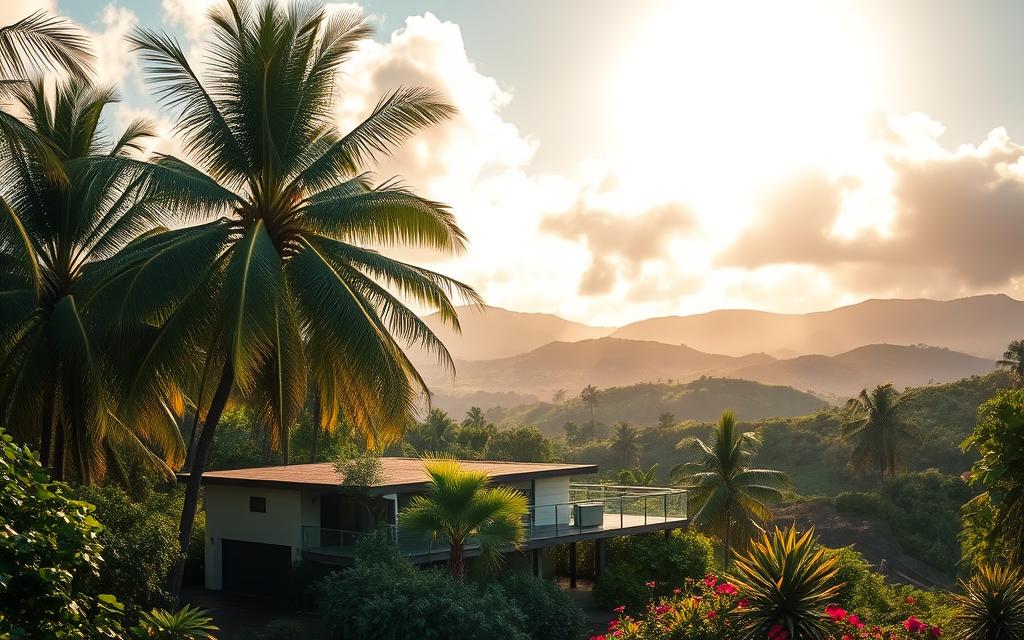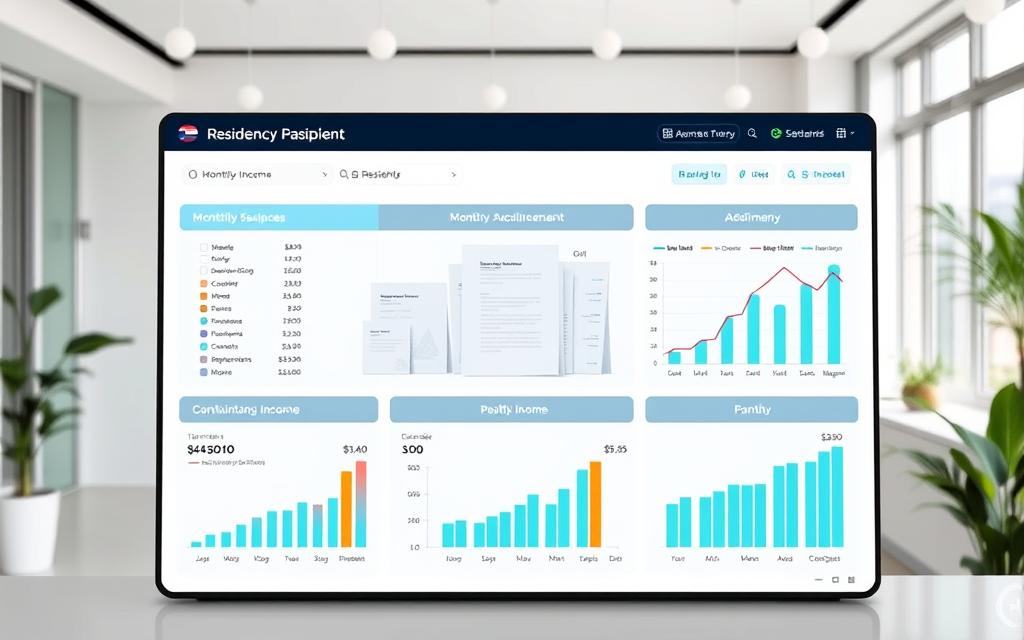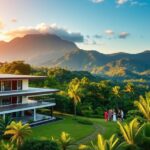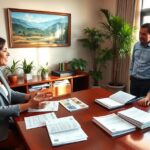Passive Income Requirements for Costa Rica Residency

Did you know that over 10% of Costa Rica’s population consists of foreigners? This stunning country has become a top destination for those seeking a vibrant lifestyle and a fresh start. With its lush landscapes, stable government, and welcoming culture, it’s no wonder so many are drawn to its shores.
Obtaining residency here is a straightforward process, but it does require meeting specific financial criteria. Whether you’re planning to retire, invest, or work remotely, understanding these requirements is key to a successful application. Costa Rica offers several visa options, each tailored to different lifestyles and goals.
From its business-friendly environment to its breathtaking natural beauty, this country provides a unique opportunity for individuals and families alike. Let’s explore how you can make this dream a reality.
The country offers clear pathways to residency and eventual citizenship, making it an accessible option for those looking to settle long-term. Whether you’re drawn to the bustling streets of San José or the serene countryside, Costa Rica provides a welcoming environment for families and professionals.
Over the course of a year or more, residents enjoy the benefits of a stable government and a high standard of living. The nation’s literacy rate of over 97% and robust healthcare system further enhance its appeal. For digital nomads, the blend of modern amenities and natural beauty creates an ideal workspace.
In the following sections, we’ll dive deeper into the application process and what it takes to make this dream a reality. From financial criteria to cultural integration, we’ll guide you through every step of your journey to becoming a Costa Rican resident.
Understanding Passive Income Requirements for Costa Rica Residency

Proving consistent earnings is a key step in securing residency here. Many expats find that demonstrating a steady monthly income is essential for meeting the financial criteria. This ensures applicants can sustain themselves without relying on local employment.
For example, the Rentista Visa requires proof of at least $2,500 USD per month for a minimum of two years. Alternatively, a deposit of $60,000 USD in a local bank can fulfill this requirement. These options provide flexibility for those with diverse financial portfolios.
Applicants must also provide reliable documentation to verify their income. This could include bank statements, pension fund details, or investment records. Ensuring these documents are accurate and up-to-date is crucial for a smooth application process.
Understanding these requirements is vital for expats planning to relocate. Whether through investments, pensions, or other sources, meeting the financial thresholds is a critical step. For more details on the legal requirements, visit our guide on residency criteria.
By meeting these standards, applicants can confidently navigate the residency process. This not only fulfills the financial requirement but also sets the foundation for a successful transition to life in Costa Rica.
Overview of the Rentista Residency
The Rentista path is ideal for those with a steady monthly income. Applicants must demonstrate earnings of at least $2,500 per month for two years. Alternatively, a bank deposit of $60,000 in a local financial institution can fulfill this requirement.
Proper document preparation is essential. This includes bank statements, income certifications, and translated records. Ensuring these are accurate and up-to-date will streamline the application process.
Investment and Permanent Residency Explained
The investment path requires a minimum of $150,000 in real estate or government-approved business ventures. This option not only secures residency but also contributes to the local economy. It’s a popular choice for entrepreneurs and investors.
Permanent residency offers long-term stability and fewer restrictions. Applicants must first hold temporary residency for three years. This status grants full work rights and eliminates the need for regular permit renewals.
Both paths require careful planning with respect to banking and document submission. Whether you choose investment or permanent residency, meeting the financial thresholds is crucial for success.
Quality of Life and Natural Beauty
Living here means waking up to breathtaking landscapes every day. From pristine beaches to lush rainforests, the country’s natural beauty is unmatched. The warm climate and welcoming communities make it an ideal place to call home.
The healthcare system is robust and accessible, ensuring a high standard of living. Families can enjoy free schooling and a safe environment for children to grow. These factors contribute to an improved quality of life for residents.
Strategic Location and Safety
Costa Rica’s central location makes it a convenient hub for travel. Its stable government and low crime rate provide a sense of security for families and retirees. The country’s commitment to peace and sustainability enhances its appeal.
Real estate opportunities here are diverse, offering everything from beachfront properties to mountain retreats. Investing in a home not only provides comfort but also serves as a solid financial decision. For more insights, check out our guide on residency benefits.
By choosing this destination, you’re not just finding a place to live—you’re building a life filled with adventure, security, and fulfillment.
Securing Your Provisional Visa and Consulate Steps
The first step is applying for a provisional visa at a Costa Rican consulate. This involves submitting required documents, such as proof of income, background checks, and a completed application form. Each consulate may have specific requirements, so it’s essential to verify these beforehand.
For retirees, proof of a lifetime pension is necessary, while investors must show evidence of their financial commitment. Digital nomads can apply for a specialized visa by demonstrating a steady remote income. Proper preparation and timely submission are critical to avoid delays.
Fingerprint Registration and Final Application
Once in Costa Rica, applicants must register their fingerprints at the Ministry of Public Security. This step is mandatory and must be completed within the first few weeks of arrival. It’s a vital part of the process, as it verifies your identity and ties your application to your biometric data.
After fingerprint registration, the final application is submitted to immigration authorities. This includes all supporting documents, such as apostilled records and translated paperwork. Ensuring everything is accurate and up-to-date minimizes the risk of complications.
Whether you’re an investor, retiree, or remote worker, understanding these steps is key to achieving temporary residency. By following the process diligently, you can enjoy the benefits of living in this beautiful country.
Essential Document Preparation and Legalization
Preparing the right documents is a critical step in securing your residency in Costa Rica. Ensuring all paperwork is accurate and properly legalized can save you time and prevent delays. This process involves obtaining apostilles, translating documents, and conducting thorough background checks.
Apostille and Document Translation Requirements
All official documents, such as birth certificates and marriage certificates, must be apostilled or legalized. This step verifies the authenticity of the documents for use in Costa Rica. It’s essential to check the specific requirements for each document to ensure compliance.
Additionally, documents must be translated into Spanish by a certified translator. Accurate translations are crucial for the application process. Common pitfalls include incomplete translations or using uncertified services, which can lead to delays.
Legal Documentation and Background Checks
Background checks are a mandatory part of the residency application. Police clearance certificates must be obtained from your home country and should not be older than six months. These checks ensure you meet the legal standards for residency.
Properly preparing your documents involves more than just gathering them. It’s about ensuring each piece of paperwork meets the strict requirements set by Costa Rican authorities. This includes verifying the validity of your birth certificate, marriage certificate, and other essential records.
By following these steps diligently, you can streamline your application process. This not only helps you meet the legal requirements but also sets the foundation for a successful transition to life in Costa Rica.
Financial Criteria and Income Evidence for Residency
Meeting the financial criteria for residency involves more than just showing a bank balance. It requires a clear demonstration of your ability to sustain yourself without relying on local employment. This is where detailed financial documentation comes into play.
Proof of Passive Income and Financial Stability
One of the key aspects of the application is proving a steady monthly income. For many visas, this means showing earnings of at least $2,500 per month. This can come from various sources, such as pensions, investments, or rental income.
It’s crucial to provide reliable documentation that verifies this income. This could include bank statements, pension fund details, or investment records. Ensuring these documents are accurate and up-to-date is essential for a smooth application process.
Bank Statements and Income Certification
Bank statements play a vital role in demonstrating your financial stability. They should reflect consistent deposits and a healthy balance. Income certifications, on the other hand, provide official proof of your earnings.
When preparing these documents, make sure they are comprehensive and well-organized. Transparency in documenting the source of your income is key. This not only fulfills the financial requirement but also sets the foundation for a successful transition to life in Costa Rica.
By following these steps diligently, you can confidently navigate the financial scrutiny of the residency process. This ensures you meet all necessary criteria and enjoy a smooth transition to your new home.
Tailoring Your Residency Journey: Options for Retirees and Digital Nomads
Costa Rica’s residency options cater to diverse lifestyles, offering tailored solutions for retirees and remote workers. Whether you’re looking to enjoy your golden years or work from a tropical paradise, there’s a path designed to meet your needs. Understanding these options helps you create a personalized plan that aligns with your goals.
Pensionado Visa for Retirees
The Pensionado Visa is ideal for retirees seeking a relaxed lifestyle. To qualify, individuals must demonstrate a stable monthly income of at least $1,000. This can come from pensions, annuities, or other retirement funds.
Documentation is key to a successful application. Retirees must provide proof of income, such as pension statements or bank records. These documents must be apostilled and translated into Spanish for submission.
This visa offers long-term benefits, including access to healthcare and discounts on services. It’s a popular choice for those looking to enjoy their retirement in a welcoming and affordable environment.
Opportunities for Digital Nomads
For remote workers, Costa Rica offers flexible residency options. The digital nomad visa requires proof of a steady monthly income of $3,000 for individuals or $5,000 for families. This ensures applicants can support themselves while living and working in the country.
Health insurance with a minimum coverage of $50,000 is mandatory. This requirement ensures digital nomads have access to quality healthcare during their stay. The application process is streamlined, with decisions typically issued within 14 days.
This visa allows for a one-year stay, with the option to renew without leaving the country. It’s an excellent choice for those who want to combine work with the beauty of Costa Rica’s landscapes.
Whether you’re an individual planning your retirement or a company supporting remote employees, Costa Rica’s residency options provide flexibility and opportunity. For more insights, explore our guide on investor residency vs permanent residency.
Strategic Business Investments and Real Estate Opportunities in Costa Rica
Strategic investments in this Central American hub can unlock opportunities for permanent residency. By focusing on the booming real estate market, investors can achieve both financial growth and long-term stability. This approach offers a unique way to secure your future while contributing to the local economy.
The real estate market here is thriving, with property valuations often lower than in other popular destinations. This affordability makes it an attractive way for savvy investors to enter the market. Whether you’re interested in residential or commercial properties, there are ample opportunities to generate consistent returns.
Investing in local businesses is another viable way to transition from temporary to permanent residency. By committing to government-approved ventures, you not only strengthen your financial portfolio but also enhance your long-term position in the country. This dual benefit makes strategic investments a compelling choice for many.
For those looking to maximize their returns, understanding the local market dynamics is key. Factors like proximity to amenities, accessibility, and safety ratings play a significant role in property success. Networking with other investors can also provide valuable insights and improve your investment strategy.
By leveraging these opportunities, you can secure permanent residency while enjoying the financial rewards of your investments. For more details on property requirements, visit our guide on investor residency.
Insider Tips for a Smooth Transition to Costa Rican Life
Adapting to a new country can be both exciting and challenging, but with the right approach, it becomes a rewarding experience. Whether you’re a worker, a former tourist, or a remote professional, these insider tips will help you navigate the transition with ease.
Practical Advice on Local Integration
Understanding local customs is essential for a seamless transition. Take time to learn basic Spanish phrases, as this will help you connect with the community. Embrace the "Pura Vida" lifestyle, which emphasizes simplicity and positivity.
For workers and digital nomads, establishing a routine can make the adjustment smoother. Explore local markets, join expat groups, and participate in community events. These activities not only help you integrate but also enrich your experience.
Former tourists often face unique challenges when transitioning to residency. Familiarize yourself with local laws, transportation systems, and healthcare options. This knowledge will make daily life more manageable and enjoyable.
Leveraging Professional Assistance
Navigating immigration procedures can be complex, but professional assistance simplifies the process. Legal experts and specialized firms provide invaluable support, ensuring your documents are accurate and submitted on time.
For workers and retirees, professional guidance is particularly beneficial. These experts can help you understand visa requirements, tax obligations, and property laws. Their expertise saves time and reduces stress during the transition.
Former tourists often find that professional assistance bridges the gap between short-term visits and long-term residency. By working with experts, you can avoid common pitfalls and focus on building your new life.
By following these tips and leveraging professional support, you can make your transition to Costa Rican life smooth and enjoyable. Take time to adapt, embrace the culture, and seek guidance when needed. Your journey to a fulfilling life abroad starts here.
Conclusion
Embarking on the journey to relocate to this Central American gem opens doors to a life of opportunity and fulfillment. We’ve explored the essentials, from demonstrating a monthly income of at least 2,500 to navigating the application process with precision. Whether you’re a retiree or a digital nomad, the diverse residency options cater to your unique needs.
Proper preparation is key. Ensuring accurate documentation and following established procedures meticulously will streamline your path to success. The rewards of this process are immense, offering a chance to embrace a vibrant culture and stunning landscapes.
Take the next step with confidence. Relocating here is more than a change of address—it’s a transformative experience. Start your journey today and discover the endless possibilities that await. For more guidance, visit our detailed guide.


